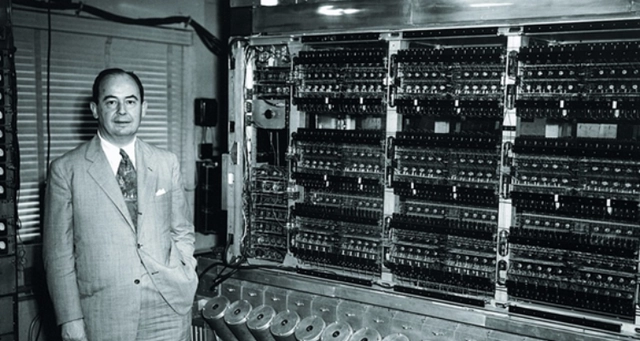
The design philosophy of the Von Neumann computer is: 1. "Programs and data are expressed in binary"; in a computer that stores programs, data and instructions are stored in the memory in binary form. 2. "Stored program control"; the program is input into the computer and stored in the internal memory (storage principle). During operation, the controller fetches the instructions stored in the internal memory in address order (access instructions in address order), and then Analyze the instruction, execute the function of the instruction, when encountering a transfer instruction, transfer to the transfer address, and then access the instructions in address order (program control).

The operating environment of this tutorial: Windows 7 system, Dell G3 computer.
Von Neumann computer (an electronic digital computer using the von Neumann system mechanism) generally refers to the von Neumann machine, a computer designed based on the stored program concept proposed by von Neumann. The main features are: instructions and data are stored in binary form in the memory; instructions are executed according to the order in which they are stored.
The von Neumann architecture, also known as the Von Neumann model or the Princeton architecture, is a merging of program instruction memory and data memory Computer design concept structure together. The computer designed based on the von Neumann structure is called a von Neumann computer, also known as a stored program computer.
The design idea of von Neumann computer
The main design idea of von Neumann computer is: the numerical system of digital computer Binary; the computer is supposed to execute programs in sequence. In a computer, the program (including instructions and data) is stored in the main memory in advance. When the computer runs the program, it can automatically and continuously retrieve the instructions from the memory and execute them; the data and instructions are stored in binary form. in memory.
Programs and data are represented in binary
In a computer that stores programs, data and instructions are stored in binary form in the memory. Judging from the contents stored in the memory, there is no difference between the two. They are both code sequences composed of 0 and 1, but their respective agreed meanings are different.
When the computer reads instructions, it treats the information read from the computer as instructions; when it reads data, it treats the information read from the computer as operands. Data and instructions have been distinguished in software compilation, so under normal circumstances there will be no confusion between the two. Sometimes we also refer to the data and instructions stored in the memory as data, because the program information itself can also be used as an object to be processed for processing. For example, when compiling against a program, the source program is treated as an object to be processed.
Stored program control
Stored program control is stored program and program control. The program is input into the computer and stored in the internal memory (storage principle). When, the controller fetches the instructions stored in the internal memory in address order (access instructions in address order), then analyzes the instructions and executes the function of the instructions. When a transfer instruction is encountered, it transfers to the transfer address, and then accesses the instructions in address order. (Programmed control).

Expand knowledge:
Von Neumann type computers generally have the following five functions: Must have the ability to long-term memory of programs, data, intermediate results and final operation results; be able to complete various arithmetic, logical operations and data transmission and other data processing capabilities; be able to control the program direction as needed, and be able to control various aspects of the machine according to instructions Components coordinate operations; can output processing results to users as required.
Von Neumann type computer essentially adopts a serial sequential processing working mechanism. Even if the relevant data has been prepared, the instruction sequence must be executed one by one. One of the fundamental directions for improving computer performance is parallel processing. Therefore, in recent years, people have sought to break through the constraints of the traditional von Neumann system. This effort is called non-Neumannization. The discussion of so-called non-Neumannization is still controversial, and it is generally believed that it manifests itself in the following three aspects.
(1) Within the scope of the von Neumann system, the traditional von Neumann machine is modified, such as using multiple processing components to form flow processing and relying on time overlap to improve processing efficiency; and For example, an array machine structure can be formed to form a single instruction stream and multiple data streams to improve processing speed. These directions have become relatively mature and have become standard structures;
(2) Use multiple von Neumann machines to form a multi-machine system to support parallel algorithm structures. Research in this area is currently relatively active;
(3) Fundamentally change the control flow driving method of von Neumann machine. For example, in a data flow computer that adopts a data flow driven working mode, as long as the data is ready, the relevant instructions can be executed in parallel. This is a truly non-Neumannized computer that opens up new vistas for parallel processing but is still under experimental exploration due to the complexity of control.
For more related knowledge, please visit the FAQ column!
The above is the detailed content of What is the design philosophy of the von Neumann computer?. For more information, please follow other related articles on the PHP Chinese website!
 Computer Languages
Computer Languages
 Computer application areas
Computer application areas
 What is the encoding used inside a computer to process data and instructions?
What is the encoding used inside a computer to process data and instructions?
 The main reason why computers use binary
The main reason why computers use binary
 What are the main characteristics of computers?
What are the main characteristics of computers?
 What are the basic components of a computer?
What are the basic components of a computer?
 What keys do arrows refer to in computers?
What keys do arrows refer to in computers?
 How to recover browser history on computer
How to recover browser history on computer